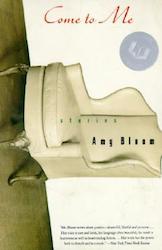
This is my first book by Amy Bloom, so I really had no idea what to expect. Throw in the fact that I don’t read collections of stories very often and this is really new territory for me.
Come to Me is a collection of a dozen stories, a few of which are connected by a character or two in common. But in every case, the story has at its core a dysfunctional or inappropriate relationship. We have 18 year olds marrying 50 year olds, married couples taking lovers together, a married woman who has an affair with a transvestite hairdresser, parents who drive children away, even a father who threatens to kill his own child. It’s an odd collection of characters who are all struggling to make sense of their lives.
None of this is a surprise when you learn that Amy Bloom was a practicing psychotherapist when she wrote this book. She remained a therapist until about ten years ago. In fact, a couple of therapists feature in the stories. So her experience with people in therapy have supplied her with insights into humanity most of us can’t have.
Bloom has an uncanny ability to draw the reader into each new story in an amazingly quick fashion. Within a paragraph or two, the reader’s immersed in the new dynamic of each tale.
My only hesitation with this collection (other than the fact that everyone’s screwed up) is that on occasion Bloom adds an element extremely abruptly. And one story ends that way, so abruptly that it was jarring.
But if that’s my only real complaint with a debut work, I have to mark it a success. Bloom is unusual in that she’s written four collections of stories and four novels. Most fiction writers focus on one or the other throughout the bulk of their careers. I’m anxious, then, to read one of her novels as a comparison. Her most recent novel, White Houses, is historical fiction, so that one especially interests me. If her novels are as compelling as her short stories, I’ll be looking forward to reading them all.
Come to Me is a collection of a dozen stories, a few of which are connected by a character or two in common. But in every case, the story has at its core a dysfunctional or inappropriate relationship. We have 18 year olds marrying 50 year olds, married couples taking lovers together, a married woman who has an affair with a transvestite hairdresser, parents who drive children away, even a father who threatens to kill his own child. It’s an odd collection of characters who are all struggling to make sense of their lives.
None of this is a surprise when you learn that Amy Bloom was a practicing psychotherapist when she wrote this book. She remained a therapist until about ten years ago. In fact, a couple of therapists feature in the stories. So her experience with people in therapy have supplied her with insights into humanity most of us can’t have.
Bloom has an uncanny ability to draw the reader into each new story in an amazingly quick fashion. Within a paragraph or two, the reader’s immersed in the new dynamic of each tale.
My only hesitation with this collection (other than the fact that everyone’s screwed up) is that on occasion Bloom adds an element extremely abruptly. And one story ends that way, so abruptly that it was jarring.
But if that’s my only real complaint with a debut work, I have to mark it a success. Bloom is unusual in that she’s written four collections of stories and four novels. Most fiction writers focus on one or the other throughout the bulk of their careers. I’m anxious, then, to read one of her novels as a comparison. Her most recent novel, White Houses, is historical fiction, so that one especially interests me. If her novels are as compelling as her short stories, I’ll be looking forward to reading them all.
 RSS Feed
RSS Feed
